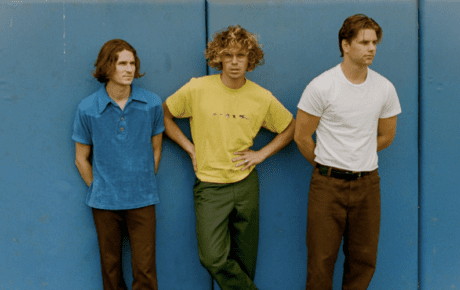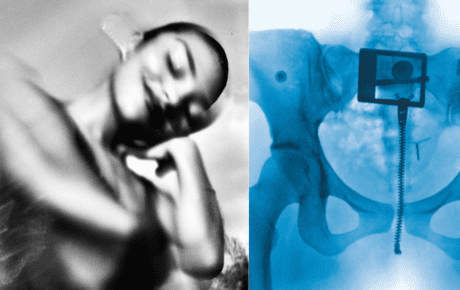In cultural terms, the course of “popular” music has often been dictated by prevailing fads and fashions, and its harshest critics have often dismissed it as disposable. Yet rock, pop, and modern music’s myriad subgenres have nonetheless inspired some of the most enduring documentaries of our age – and, if Netflix’s current run of superlative music documentaries is anything to go by, that’s not going to end anytime soon. To celebrate this, we grab some popcorn, dim the lights, and revisit the 37 best music documentaries of the past 50 years.
Gimme Shelter (1970)
Often seen to mirror the death of the idealistic 60s, the free concert The Rolling Stones performed at California’s Altamont Speedway in December 1969 was tagged onto the end of their triumphant US tour and intended as a celebratory night out for fans. However, Gimme Shelter, the film the Maysles brothers shot that fateful night, captured one of the worst tragedies in rock history when fan Meredith Hunter was stabbed to death by Hells Angel Alan Passaro while the Stones performed. Five decades later, it has lost none of its bleak power; a feeling of dread still hangs over this most apocalyptic of all rock documentaries.
Elvis: That’s The Way It Is (1970)
The critically hailed ’68 Comeback Special arguably reintroduced Elvis Presley to a serious rock’n’roll audience, but director Denis Sanders’ Elvis: That’s The Way It Is was The King’s first non-dramatic movie since his film career began in 1956. Though ostensibly a record of Presley’s Las Vegas residency during the summer of 1970, there’s also plenty of compelling backstage and off-duty footage, while the electrifying live performances depict Elvis on lean and vital form.
Amazing Grace (1972)
Sydney Pollack’s Aretha Franklin concert film, Amazing Grace, was captured in 1972, but ended up languishing in the vaults owing to various technical and legal issues. After producer Alan Elliott acquired the rights to it, however, the film was finally restored and released in August 2018, following Franklin’s death. A remarkable concert film, Amazing Grace tracks the Queen Of Soul’s return to gospel music in 1972 with the choir at New Bethel Baptist Church in Watts, Los Angeles. Variety said that her on-screen performance “sounds like the holiest of trumpets, with every note piercingly bright yet as soft as velvet.” Who are we to argue?
Cracked Actor (1974)
Ziggy acolytes have DA Pennebaker’s concert film Ziggy Stardust And The Spiders From Mars, but Alan Yentob’s BBC-sponsored documentary Cracked Actor is equally mandatory. Filmed while David Bowie was touring Diamond Dogs in 1974 and struggling with a nagging cocaine dependency, it depicts the artist in a markedly fragile mental state. Indeed, it’s thrown into even sharper relief when you consider that, over the next 12 months, Bowie would somehow also complete Young Americans and star in The Man Who Fell To Earth.
The Decline Of Western Civilization (1981)
She’s overseen hit movies such as Wayne’s World, but Penelope Spheeris’ magnum opus surely still remains her three-part The Decline Of Western Civilization. Finally issued as a 3DVD box set in 2015, the entertaining (if sometimes preposterous) second volume, The Metal Years, depicted LA’s late 80s metal scene in all its pomp, while ’98’s III concentrated on the city’s newer breed of Mohican-sporting “gutter punks.” However, it’s Spheeris’ original 1981 documentary, The Decline Of Western Civilization – a warts’n’all portrayal of the LA punk scene, with electrifying footage of The Germs, X, and Circle Jerks, which remains the trilogy’s iconic flick.
Let’s Get Lost (1988)
Brilliant, mercurial jazz trumpeter Chet Baker possessed looks worthy of James Dean, while his talent led him to record with jazz legends such as Charlie Parkerand Gerry Mulligan. However, after decades of heroin addiction and hard living, he died prematurely when he fell from a hotel window in Amsterdam. Baker’s turbulent life and career is framed beautifully in Bruce Weber’s critically acclaimed, novelistic Let’s Get Lost, which features insights from Baker’s ex-wives and former associates, plus vintage footage of Baker in his prime on US TV’s The Steve Allen Show from the late 50s.
Rattle And Hum (1988)
U2’s sixth LP, Rattle And Hum, was a runaway commercial success which sold 14 million copies, though the critics were divided over the Dublin quartet’s exploration of American roots music. Nonetheless, Phil Joanou’s emotive companion rockumentary captures U2’s rites of passage as they become fully fledged, stadium-filling superstars. Simply for its breathtaking live footage shot in Arizona’s Sun Devil Stadium, Rattle And Hum remains worthy of the price of admission.
Rhyme & Reason (1997)
Peter Spirer’s exhaustive film explores the history of hip-hop culture and reveals how rap took the international music scene by storm. Beginning in the dingy tenements of the Bronx and ending in Hollywood, where many of the genre’s leading lights have relocated to become multi-millionaires, Rhyme & Reason lets the artists speak for themselves, with veteran old-school rappers (KRS-One, Chuck D) and contemporaneous hitmakers (Wu-Tang Clan, Dr Dre, The Fugees) taking the opportunity to speak frankly about everything from sex to crime, drugs and the next generation.
Meeting People Is Easy (1998)
Radiohead’s critically adored third LP, 1997’s OK Computer, launched them onto the international stage, selling around five million copies worldwide; the subsequent world tour (taking in over 100 gigs) almost killed the band and left Thom Yorke on the verge of a nervous breakdown. The drama of the trek is chronicled by director Grant Gee’s Grammy Award-winning Meeting People Is Easy: a numb, abstract, yet compelling capture of the events presented using disorienting cinematic methods including slow tracking shots and time-lapse photography.
Buena Vista Social Club (1999)
Directed by Wim Wenders and globally acclaimed on its initial release, Buena Vista Social Club chronicles Ry Cooder’s quest to bring together an ensemble of legendary, octogenarian Cuban musicians to record an LP and then perform the music in Europe and at a historic concert in New York’s legendary Carnegie Hall. Wenders’ cinematography is typically lush and beautifully shot; the Cuban musicians’ roguish charm is undeniable. The film fully deserved its Academy Award nomination in 2000.
https://youtu.be/GajRJwloroI
The Filth And The Fury (2000)
As all serious punk fans know, The Great Rock’n’Roll Swindle was (and still is) great fun, but ultimately it was Machiavellian manager Malcolm McLaren’s outrageous fantasy version of Sex Pistols’ history, and hard facts rarely entered into it. Two decades on, however, director Julien Temple gave the band a chance to set the record straight, which they did in no uncertain terms during The Filth And The Fury. Filmed in silhouette, the individual members are utterly candid in recalling the real story of their notorious past, with the normally cynical John Lydon even breaking down over the senseless death of Sid Vicious.
Made In Sheffield: The Birth Of Electronic Pop (2002)
Punk’s revolutionary DIY ethos may have set off a chain reaction around the UK, but as Eve Wood’s provocative Made In Sheffield asserts, the hipper scenesters in this seemingly dour Yorkshire steel town already knew guitars were passé and that synthesizers would reconfigure the musical landscape in the post-punk world. They weren’t wrong, either, as this transcendent little Sheffield scene spawned electro-pop giants such as The Human League, Heaven 17, and Cabaret Voltaire, all of whom reflect on this intense period when, as Heaven 17’s Ian Craig Marsh so memorably puts it, “We thought we were killing off rock’n’roll.”
I Am Trying To Break Your Heart: A Film About Wilco (2002)
Influenced by the horrific events of 9/11, Yankee Hotel Foxtrot, the fourth album by Chicagoan Americana pioneers turned alt.rockers Wilco, is often cited as their landmark release. Its creation, however, was fraught with difficulties, and Sam Jones’ engrossing black-and-white film I Am Trying To Break Your Heartconsequently documents the internal tensions which resulted in the departure of multi-instrumentalist Jay Bennett and the events which led to Wilco recording Yankee Hotel Foxtrot for one Warner Bros imprint (Reprise) and eventually releasing it through another (Nonesuch).
Be Here To Love Me: A Film About Townes Van Zandt (2004)
Late Texan troubadour Townes Van Zandt was arguably one of the greatest country-folk singer-songwriters of them all, but he was also a tormented soul. Compiled from intimate home movies, old TV performances and detailed interviews with contemporaries such as Steve Earle and Guy Clark, director Margaret Brown’s Be Here To Love Me paints a sympathetic portrait of a sensitive artist who would count superstars such as Willie Nelson among his fans, despite the fact that his poetic, fatalistic songs often sprang from his lifelong struggles with drink, drugs and bipolar disorder.
https://youtu.be/ydd2zoP1Tz0
Metallica: Some Kind Of Monster (2004)
When metal leviathans Metallica agreed to allow directors Joe Berlinger and Bruce Sinofsky to shoot a no-holds-barred film, they got rather more than they bargained for. Indeed, the subsequent Some Kind Of Monster documents arguably the band’s most turbulent era: a period wherein bassist Jason Newsted quits, frontman James Hetfield enters rehab, and a long-simmering power struggle between Hetfield and drummer Lars Ulrich spills over and launches a tsunami of emotions.
No Direction Home (2005)
Bob Dylan buffs can also gorge on excellent docs including DA Pennebaker’s brilliant, gonzo-style Dont Look Back and Murray Lerner’s The Other Side Of The Mirror, but Martin Scorsese’s No Direction Home is surely the most thorough and comprehensive examination of the iconic trailblazer’s life and times. Including rarely seen Pennebaker-filmed footage circa ’66, exclusive interviews with Allen Ginsberg and Dylan’s ex-girlfriend Suze Rotolo, not to mention Dylan’s own candid commentary about his seismic early years, No Direction Homeremains as close to lifting the veil as Dylan fans can get.
We Jam Econo: The Story Of The Minutemen (2005)
Punk-funk trailblazers The Minutemen were cited as influential by just about every US punk outfit worth their salt during the 80s, but their career was cruelly terminated when frontman D Boon was killed in a car crash in December 1985, aged just 27. Copping its moniker from SoCal slang for the band’s dedication to DIY low-cost record production and touring, We Jam Econo features poignant interviews with the band’s surviving members Mike Watt and George Hurley, and, fittingly, its 2005 premiere was in the trio’s hometown of San Pedro, California.
The Devil And Daniel Johnston (2006)
Despite being diagnosed with both bipolar disorder and schizophrenia, outsider artist Daniel Johnston became a grunge-era icon thanks to his lo-fi, home-recorded music and highly prized drawings garnering praise from renowned names such as Tom Waits and Kurt Cobain. He later became the subject of director Jeff Feuerzeig’s acclaimed, if painfully intimate, The Devil And Daniel Johnston, which won the Documentary Directing Award at 2005’s prestigious Sundance Film Festival.
American Hardcore: The History Of American Punk Rock 1980-86 (2006)
Directed by Paul Rachman and based on author Steven Blush’s book American Hardcore: A Tribal History, this engaging rockumentary does exactly what it says on the tin, addressing the birth and evolution of hardcore punk in its major strongholds such as Washington, DC, Los Angeles and Chicago during the late 70s and early 80s. Featuring exclusive contemporaneous interviews with movers and shakers the likes of Black Flag’s Henry Rollins and Fugazi/Minor Threat mainstay Ian MacKaye, the film also boasts vintage live footage often supplied by the bands themselves.
https://youtu.be/VqwnC9N5-B0
Scott Walker: 30 Century Man (2007)
One of pop’s coolest ever enigmas, the naturally reclusive Scott Walkerrecorded an immaculate series of glorious, orchestrally inclined pop albums during the late 60s, before going into self-imposed exile. Finally resurfacing with 1984’s Climate Of Hunter, he went on to release a series of radical, avant-garde-inclined albums recorded at a snail’s pace. Director Stephen Kijak’s 30 Century Man was released to showcase Walker’s highly anticipated 2006 opus, The Drift, and it remains an insightful overview of his elusive career, with input from high-profile interviewees including Brian Eno and the film’s executive producer, David Bowie.
Oil City Confidential (2009)
Their glory days were cut short by internal squabbling and line-up changes, yet supercharged Canvey Island R&B outfit Dr Feelgood were arguably the coolest thing on eight legs during Britain’s pre-punk pub rock era. Warmly received by the critics on release in 2010, director Julien Temple’s insightful Oil City Confidential inevitably homes in on the lives of the band’s two major players: much-missed, harmonica-toting frontman Lee Brilleaux and studious English literature teacher turned manic, strutting lead guitarist Wilko Johnson.
Beyond The Lighted Stage (2010)
Enduring prog rock trio Rush are akin to deities in their native Canada, and have earned a devoted audience that’s followed them for the best part of five decades. Their back catalog includes seismic LPs such as 2112, Permanent Waves, and Moving Pictures, and their long and winding career is treated with the reverence it deserves in Scot McFadyen and Sam Dunn’s Beyond The Lighted Stage, which – aside from a wealth of backstage and personal footage – includes enthusiastic testimonials from stellar artists as diverse as Billy Corgan, Gene Simmons, and Trent Reznor.
Punk In Africa (2012)
Punk appealed to intelligent, forward-thinking kids in South Africa just as much as it did in the UK, but due to the nation’s repressive political regime, the revolution was only finally televised when Deon Maas and Keith Jones’ Punk In Africa premiered worldwide in 2012. Revealing how angry, courageous outfits such as Wild Youth and the mixed-race National Wake formed after the 1976 Soweto Riots and later handed the baton to the next generation of refuseniks in South Africa, Zimbabwe, and Mozambique, the film tells the captivating story of the original artists against Apartheid.
Looking For Johnny: The Johnny Thunders Story (2014)
Central to the story of legendary NYC proto-punks New York Dolls, and later the leader of the talented but short-lived Heartbreakers, the enigmatic Johnny Thunders inspired glam-metal and punk, yet his career was blighted by chronic drug addiction and he died in mysterious circumstances in New Orleans in 1991. In the gripping Looking For Johnny, director Danny Garcia adroitly traces the arc of a surprisingly complex life, from Thunders’ early years as a shy, baseball-adoring teen to his poignant latter years battling narcotics and leukemia.
Amy (2015)
Two years in the making, Asif Kapadia’s complex, yet intimate portrayal of Amy Winehouse’s brief, though brilliant career and her tragically premature death was billed as “the singer in her own words.” Compiled from in-depth interviews with the star’s friends, family and associates, Amy also includes extensive, previously unseen archival footage and rarely heard live performances, and is a feast for fans. First released theatrically in July 2015, Amy has since received over 30 cinematic awards and currently holds the title for the highest-grossing British documentary of all time.
What Happened, Miss Simone? (2015)
Released through Netflix in June 2015, What Happened, Miss Simone? delves into the life and times of the pioneering, genre-straddling singer-songwriter and civil-rights activist Nina Simone. Pulling in archival footage and contemporary interviews with Simone’s daughter, Lisa Simone Kelly, and close friends, this insightful film, directed by Liz Garbus, opened the 2015 Sundance Film Festival. The premiere was followed by an emotional tribute performance by John Legend. It was later nominated for an Oscar and six Emmy Awards, where it triumphed in the Outstanding Documentary category.
The Beatles: Eight Days A Week (2016)
With the exhaustive The Compleat Beatles and The Beatles Anthology already in the can, long-term Beatles addicts already have an embarrassment of quality docs to savor. The one everyone had long been anticipating, however, was director Ron Howard’s Eight Days A Week. Subtitled The Touring Years, it charts the period from 1962-66, when The Beatles were probably the hardest working band on the planet. Given a theatrical release in September 2016, Howard’s critically acclaimed opus features electrifying footage from the band’s early days at The Cavern through to their final US tour, though it’s the digitally restored film of the group wowing their adoring public at their first Shea Stadium bash which arguably best bottles the bedlam of Beatlemania.
The Slits: Here To Be Heard (2017)
Renowned for their groundbreaking, dub-infused 1979 debut album, Cut, The Slits inspired generations of artists, from Sonic Youth to Sleater-Kinney and Bikini Kill. William E Badgley’s Here To Be Heard pulls no punches in telling the story of a group that literally changed the cultural landscape of Britain in the patriarchal 70s with their furious proto-feminist battle cry. The director was allowed access to the band’s personal archives and could draw upon in-depth interviews with surviving Slits, bassist Tessa Pollitt, guitarist Viv Albertine, and original drummer Palmolive.
John & Yoko: Above Us Only Sky (2018)
Directed by the Oscar-nominated Michael Epstein (of LennoNYC fame), 2018’s revealing Above Us Only Sky explores the previously untold story of the making of John Lennon’s classic 1971 album, Imagine, as well as investigating how John and Yoko’s art, politics and music are intrinsically entwined. It also includes interviews with Yoko Ono as well as insiders such as photographer David Bailey and Lennon’s son Julian, in addition to previously unseen footage of Lennon and Ono from their private archive.
If I Leave Here Tomorrow (2018)
Compiled by director Stephen Kijak (Stones In Exile, We Are X), If I Leave Here Tomorrow covers most of the legend-enshrining aspects of legendary Southern rockers Lynyrd Skynyrd’s career. Narrated by guitarist and founding member Gary Rossington, the documentary begins by tackling the group’s initial rise from Jacksonville, Florida, takes in the plane crash that killed vocalist Ronnie Van Zant, guitarist Steve Gaines and several crew members, and covers the band’s courageous return to the fray.
The Public Image Is Rotten (2018)
Initially screened to coincide with 2018’s career-spanning multi-disc box set of the same name, Tabbert Fiiller’s The Public Image Is Rotten features reams of previously unseen footage and extremely candid interviews with PiL members past and present, though John Lydon inevitably dominates proceedings in a series of disarmingly frank interviews. It stands as both a commendable tribute to one of post-punk’s most important bands and a finely-drawn portrait of a singular frontman who, in his own words, remains “one of the very few people in pop history who will not go away.”
Quincy (2018)
Premiering on Netflix, Quincy navigates industry giant Quincy Jones’ entire career, from his time as a trumpeter, film composer, and jazz conductor, through to his legendary production work on Michael Jackson’s Thriller, his Rock And Roll Hall Of Fame induction, and his colossal 27 Grammy Award wins. Directed by Alan Hicks and Jones’ daughter Rashida, this absorbing music documentary includes contributions from high-profile stars such as former US president Barack Obama, Will Smith, Dr. Dre, Kendrick Lamar, Oprah Winfrey, and Snoop Dogg, all of whom credit Jones among their primary inspirations.
Blue Note Records: Beyond The Notes (2018)
Directed by Swiss-born, LA-based filmmaker Sophie Huber, 2018’s Blue Note Records: Beyond The Notes investigates the vision behind the iconic jazz record label that, since its inception in 1939, has actively encouraged its artists to push the envelope through jazz and way beyond. Through current recording sessions, rare archive material, and conversations with iconic Blue Note artists, the film reveals an intimate perspective of a legacy that continues to grow in stature, even in the rapidly-evolving 21st Century.
David Bowie: The Last Five Years (2019)
The second installment of a trilogy of David Bowie documentaries directed and produced by Francis Whately, 2018’s The Last Five Years is an intimate portrait of the iconic musician’s remarkable late burst of creativity which resulted in the critically-acclaimed albums The Next Day and ★, and the play Lazarus. The film includes every key member of Bowie’s The Next Day and ★ bands, and those who worked with Bowie on Lazarus, plus a wealth of unseen and rare archival footage.
https://youtu.be/RiVWBGj03Lo
Miles Davis: The Birth Of The Cool (2019)
One of the most hotly-anticipated feature-length music documentaries in recent years, Miles Davis: The Birth Of The Cool was directed by Emmy Award-winning filmmaker Stanley Nelson (The Black Panthers: Vanguards Of The Revolution), who was granted unique access to the Miles Davis Estate. Consequently, the film boasts tantalizing, never-before-seen footage including recording outtakes from studio sessions and new interviews with musicians Davis inspired, among them Quincy Jones, Carlos Santana, Clive Davis, Wayne Shorter, and Ron Carter, to name just a few.
The Two Killings Of Sam Cooke (2019)
Netflix’s ReMastered series has already distinguished itself with acclaimed music documentaries tackling Bob Marley’s wider career (Who Shot The Sheriff?) and the still-unsolved murder of Run-DMC’s DJ (Who Killed Jam Master Jay?), but The Two Killings Of Sam Cooke is a true heavyweight. Drawing upon interviews with Quincy Jones and Smokey Robinson, among others, it features rarely-seen footage and examines the oft-disputed events of the night of December 11, 1964, which led to the murder of the suave and likable pop and R&B singer, aged just 33.
Linda Ronstadt: The Sound Of My Voice (2019)
Linda Ronstadt: The Sound of My Voice enjoyed its world premiere at New York’s Tribeca Film Festival on April 26, 2019, and looked to be one of the year’s most celebrated docs. Assembled by filmmakers and long-term fans Rob Epstein and Jeffrey Friedman, the action follows the acclaimed vocalist’s emergence as a solo artist in Los Angeles clubs, after her initial success with The Stone Poneys, her superstardom of the 70s and her later work. Billboard suggested it “makes a succinct, powerful case for Ronstadt’s status as a twentieth-century music icon.”
Article originally published on uDiscoverMusic.com.












